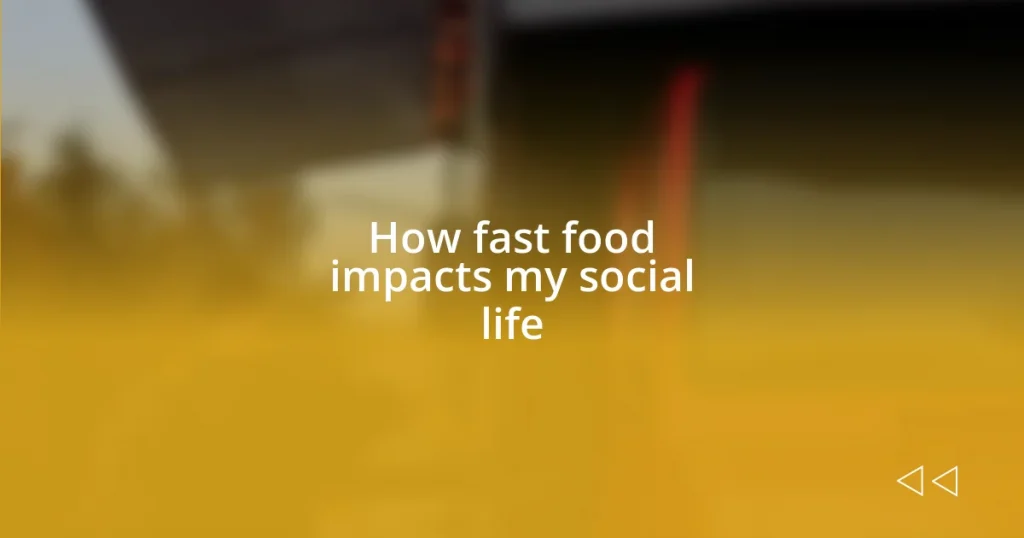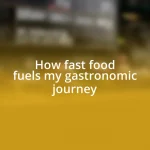Key takeaways:
- Fast food serves as a cultural and social connector, providing casual atmospheres that encourage interaction and reminiscence of shared experiences.
- Health impacts from fast food consumption can affect energy levels and self-confidence, influencing overall social engagement and connections.
- Exploring healthier dining alternatives and creating meaningful dining experiences can enhance social interactions and foster deeper relationships.
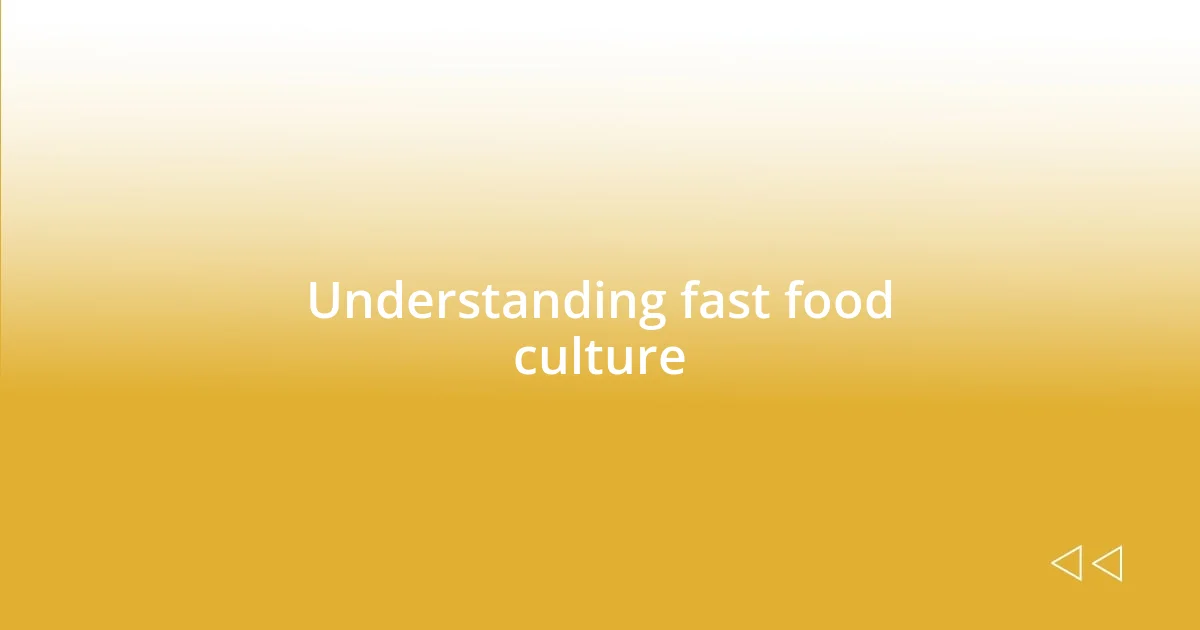
Understanding fast food culture
Fast food has become more than just a meal; it’s woven itself into the fabric of our daily lives. I remember Saturday afternoons spent grabbing fries with friends after a long week—those moments felt like the ultimate reward. Isn’t it fascinating how food can act as a social glue, bringing people together?
There’s a certain familiarity in fast food culture that many of us gravitate toward. Whether it’s the distinct aroma wafting from the drive-thru or the comforting feeling of unwrapping a burger, it creates a sense of belonging. When I think back to road trips filled with pit stops at colorful fast-food chains, I can’t help but feel nostalgia. Those shared meals turned into our own little adventures.
However, have you ever noticed how fast food establishments often serve as meeting spots for various social gatherings? From birthday parties to casual catch-ups, I’ve spent countless hours in these spaces. They encourage spontaneous interactions—a quick chat over a slice of pizza or a shared dessert can lead to genuine connections. It’s interesting how something as simple as fast food can ignite deeper conversations and create lasting memories.
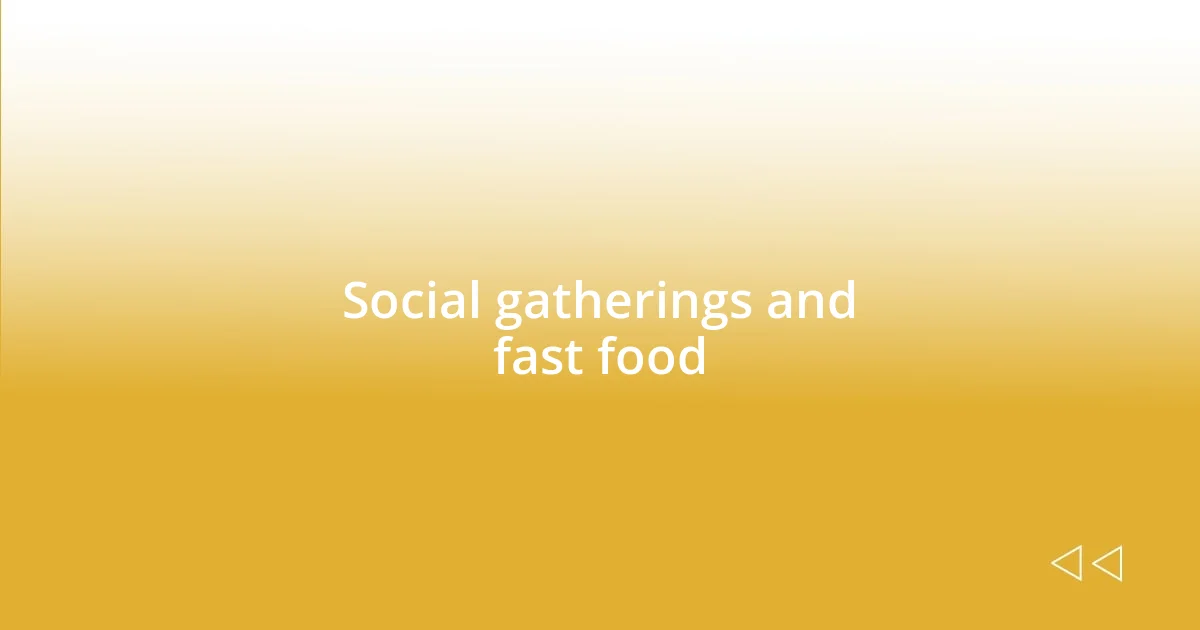
Social gatherings and fast food
When fast food emerges as the backdrop for gatherings, the dynamic shifts. I vividly recall a friend’s birthday celebrated at a popular burger joint. The laughter over greasy treats mingled with the sound of ketchup bottles being squeezed, making everything feel light-hearted and carefree. It’s a far cry from formal dining; there’s something invigorating about the casual atmosphere that encourages genuine interaction.
Attending social events at fast-food venues brings an element of nostalgia, too. While transitioning to adulthood, I often found myself revisiting fast-food chains from my youth. These familiar haunts seemed to act as a bridge connecting past friendships with present ones, creating a comforting environment where stories could flow freely. Everyone shares a similar understanding of what to expect, whether it’s that signature taste or the predictable vibe, making it easy to connect.
What strikes me most is how fast food can make gatherings accessible to all. For instance, I recently hosted a small get-together at a local taco spot. With affordable prices and no need for reservations, my friends and I could focus on simply enjoying each other’s company. That casual vibe not only made for effortless planning but also encouraged everyone to feel included.
| Aspect | Fast Food Gatherings | Formal Dining |
|---|---|---|
| Atmosphere | Casual and fun | Formal and structured |
| Cost | Affordable | Expensive |
| Time Investment | Quick and easy | Time-consuming |
| Accessibility | Widespread availability | Less accessible |

Health effects on social interactions
Health effects often extend far beyond physical health; they can significantly influence our social interactions as well. I’ve noticed that indulging in fast food frequently leaves me feeling sluggish and low on energy. This can sometimes dampen my enthusiasm to engage in social activities. Imagine heading out to meet friends, but instead of feeling vibrant and excited, you feel tired and unmotivated. It’s a stark contrast, and it can impact how you communicate and connect with others.
Here are some health effects of fast food on social interactions:
- Fatigue: Heavier meals can lead to crashes in energy levels, making it hard to stay engaged.
- Mood Fluctuations: Unhealthy food can affect my mood, sometimes leading to irritability rather than excitement during gatherings.
- Self-Confidence: Knowing that my eating habits aren’t aligned with my fitness goals can make me feel self-conscious at social events.
- Social Comparisons: Sometimes, seeing friends who maintain healthier diets can lead to feelings of insecurity or peer pressure.
These experiences reinforce the idea that health not only shapes our physical well-being but also the quality of our social interactions. So, the next time I indulge in fast food, I remind myself to balance it out with healthier choices to keep my social life thriving.
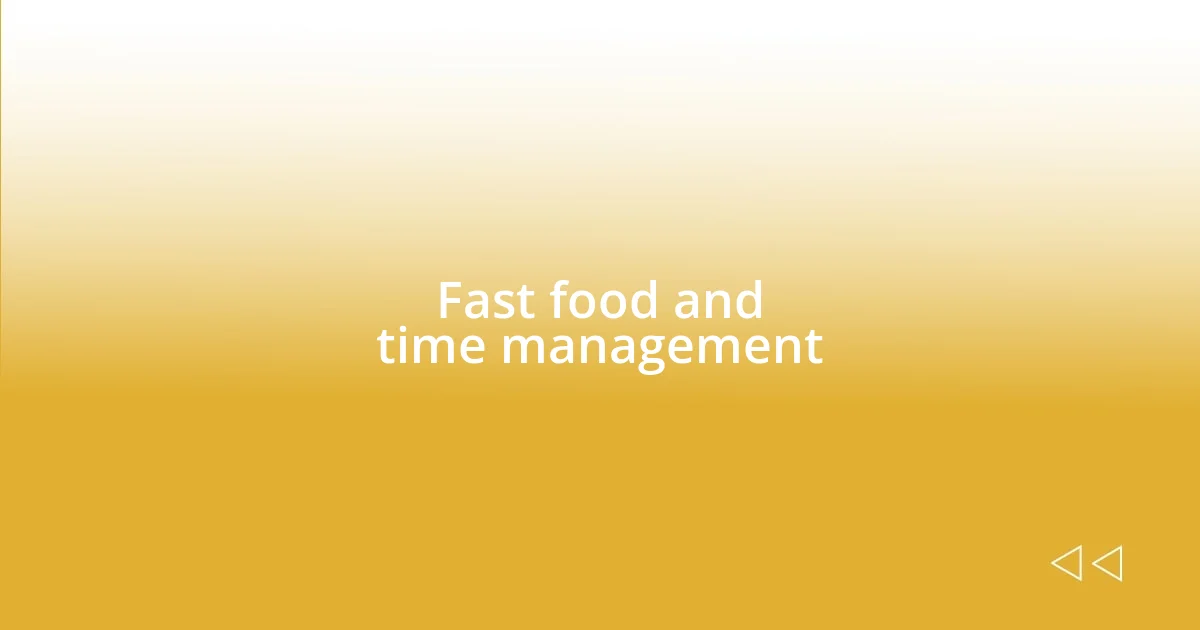
Fast food and time management
Fast food certainly plays a pivotal role in how I manage my time. On particularly hectic days, I often turn to drive-thrus for a quick meal, which allows me to squeeze in a bite to eat between meetings or errands. I can’t count how many times I’ve appreciated the fact that I can grab some nuggets and be on my way in under ten minutes. It’s efficient, but I sometimes wonder, am I sacrificing quality nutrition for convenience?
There are moments when I look back on dinners at fast food spots that turned into impromptu catch-ups with friends. Remembering one of those nights, it was a crazy Thursday, and I simply didn’t have time to cook. Stopping at a favorite taco place, I was able to share laughs and stories without the pressure of a lengthy sit-down meal. The time saved meant we could dive straight into the good moments—no long waits or elaborate setups required. In that sense, fast food often becomes a bridge, connecting time and socializing.
However, I can’t help but think about the long-term impact of relying on fast food to manage my time. While it’s a lifesaver on busy days, I occasionally find myself feeling like I’m missing out on those richer dining experiences with friends. Have you ever felt like you’ve compromised meaningful interactions for speed? I’ve found that while convenience is key, balancing fast meals with occasions that prioritize conversation and connection is essential for maintaining my social relationships.
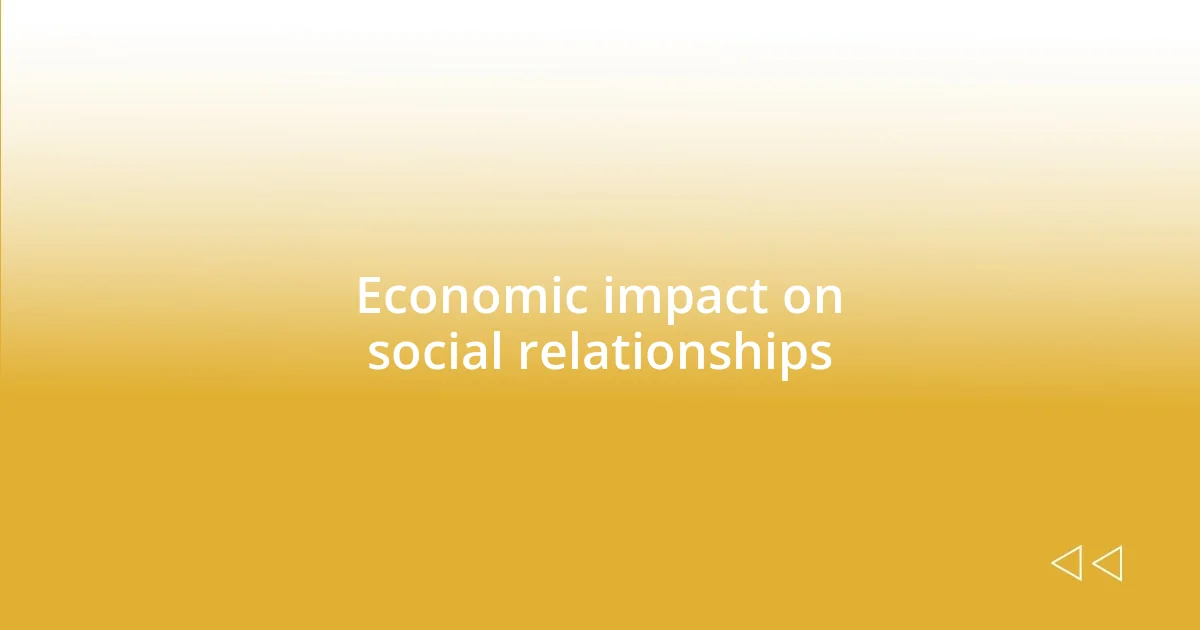
Economic impact on social relationships
Fast food certainly has a significant economic impact on social relationships. Think about it: Dining out can be expensive, and when fast food becomes the go-to option, it often leads to limited interactions. I’ve noticed that grabbing a quick burger with friends is much cheaper than a full dinner at a sit-down restaurant, but sometimes it feels like a lost opportunity for deeper connections. Have you ever felt like a quick meal didn’t quite cut it when it came to bonding?
On the flip side, while fast food may save money, the frequent reliance on it can create a shift in how we value our social gatherings. I remember a time when a friend suggested we hit our local fast food joint instead of our usual café. Sure, it was budget-friendly, but it felt a bit hollow. The ambiance of the café—the laughter, the aromas, the comfort—was replaced with the rush of a fast-food line. I realized then that spending less didn’t always equate to meaningful relationships; sometimes, it’s worth it to indulge a little for the sake of lasting memories.
Moreover, the economic implications of fast food can lead to social disparities that impact relationships. I’ve observed that friends with different financial backgrounds might choose locations that reflect their budgets, inadvertently causing feelings of exclusion. When someone suggests a trendy restaurant, and others opt for fast food to keep costs down, it can create an unspoken divide. Have you navigated a similar situation? Balancing economic realities with the desire for social connection can be tricky, but acknowledging these differences is crucial for maintaining harmony in our friendships.
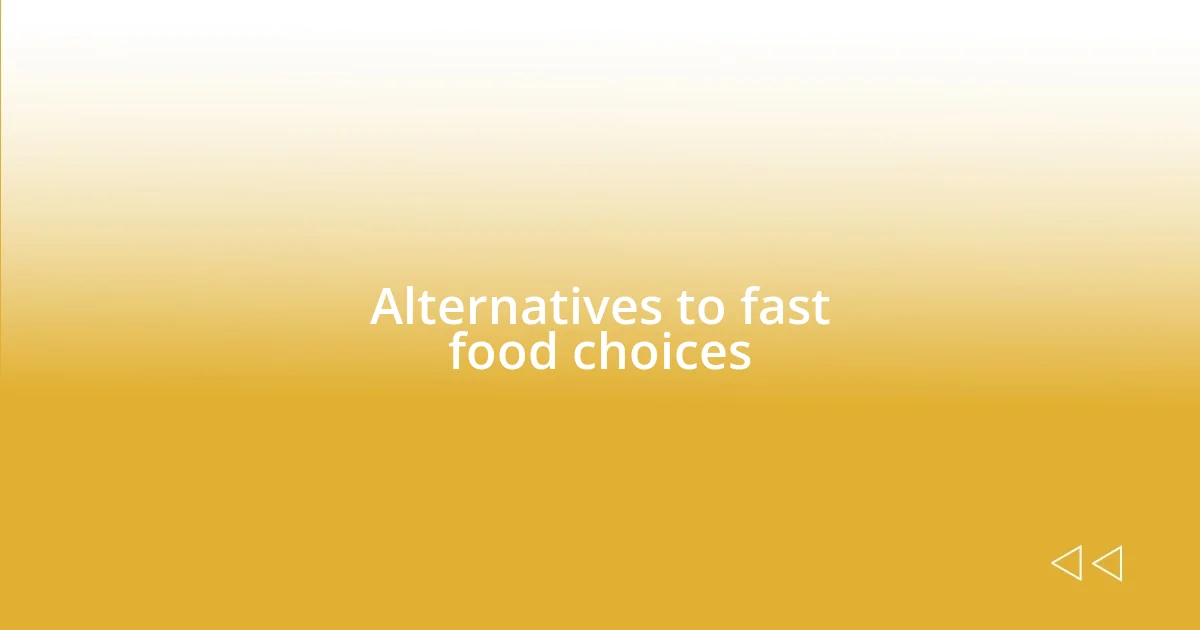
Alternatives to fast food choices
Often, I find myself craving something healthier than a burger, especially when I want to enjoy a meal with friends without the guilt. Recently, I discovered a lovely Mediterranean café that offers delicious wraps and salads. Sitting outside on a sunny day, sharing a flavorful falafel wrap, I felt the fresh ingredients not only nourished my body but also fueled our conversation, creating a vibe that fast food simply can’t replicate. Have you tried swapping out your usual fast food hangouts for places that offer fresher options?
Another alternative I’ve embraced is meal prepping. When I take the time to prepare nutritious options for the week, it transforms my routine and enhances my social life. I vividly recall a Friday evening when I pulled out my homemade quinoa bowls, bursting with roasted vegetables and chickpeas. Inviting friends over for a casual dinner felt more intimate than racing through a drive-thru. I realized that sharing a meal I’d lovingly prepared, rather than grabbing something pre-packaged, sparked deeper conversations and laughter.
Lastly, I’ve learned to appreciate the indie restaurants within my community. These gems often provide a cozy atmosphere and unique dishes that fast food chains lack. On a rainy Saturday, I slipped into a nearby taco shop, where the owner chatted with me about the origins of his recipes while I waited. Not only was I treating myself to a hearty meal, but I also connected with a local business and felt part of the fabric of my community. Isn’t it fascinating how food can lead to such meaningful experiences? Exploring these alternatives truly deepens not just my meals but also my connections with others.
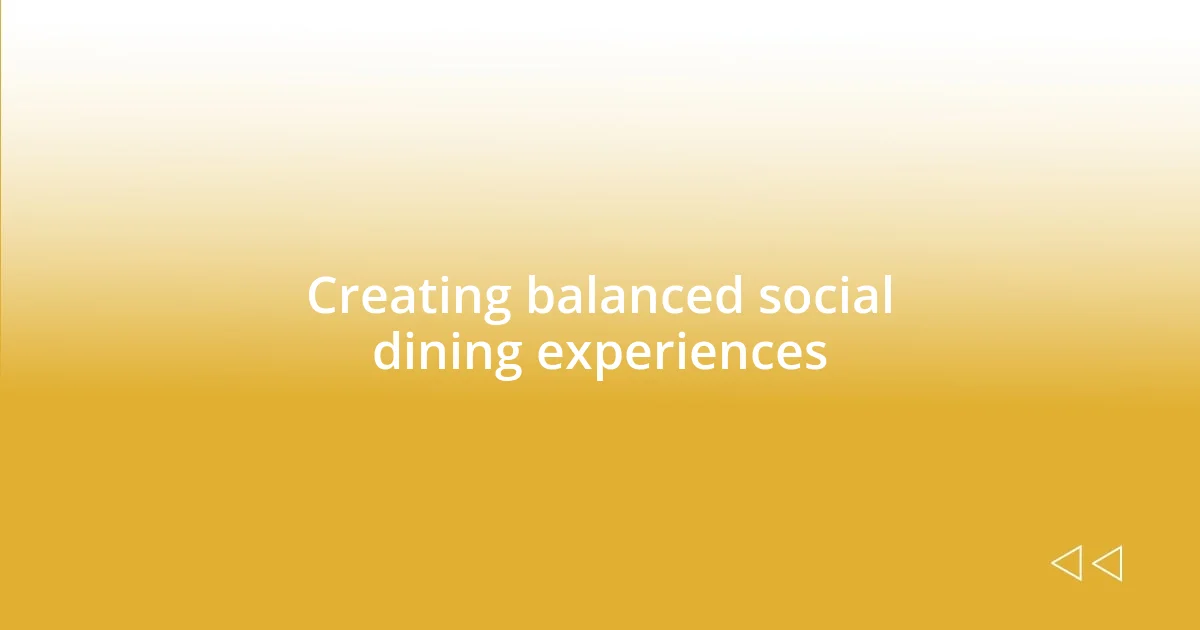
Creating balanced social dining experiences
Creating balanced social dining experiences is all about blending the joys of food with meaningful interactions. I often find that when I dine with friends, the environment significantly shapes our experience. I remember a time when we chose a vibrant outdoor setting for brunch. The energy of the place added to our laughter and chatter, making the meal far more enjoyable than any hasty fast food run could offer. Isn’t it amazing how the right atmosphere can enhance our conversations?
I’ve also discovered that seeking restaurants with shared plates can spark a sense of community among friends. A while back, I visited a tapas bar with a group, and the act of sharing small dishes encouraged conversations that flowed effortlessly. Instead of munching quietly on a single meal, we were all engaged in trying various flavors and recommending favorites to one another. It made me realize that creating a dining experience where everyone can contribute can deepen connections. Have you noticed how sharing food can truly foster a sense of togetherness?
Lastly, embracing diverse culinary experiences can enrich social outings. I once organized an international night where each friend brought a unique dish from a different culture. The table was vibrant with colors and flavors, and the conversations that unfolded around it were just as diverse. We shared stories tied to each dish, and I felt a special bond forming as we explored each other’s backgrounds through food. It struck me that how we choose to dine directly influences not just our palates but also the emotional ties we build with others. Isn’t it inspiring how food can transcend mere sustenance and become a bridge to deeper relationships?










